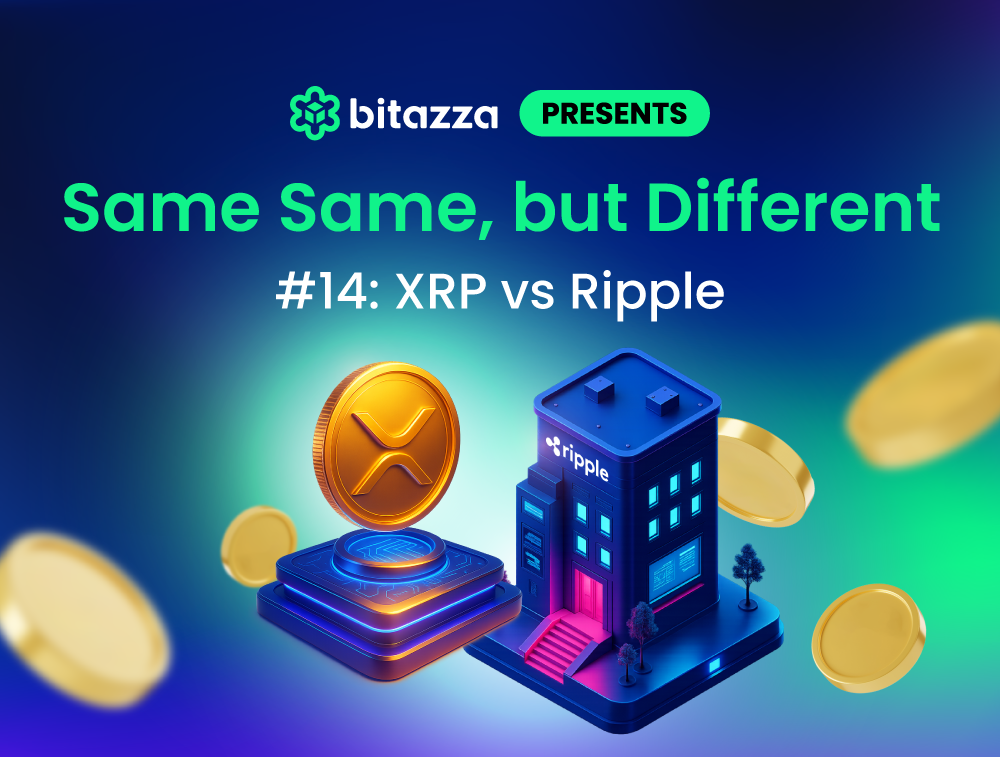Share this
Same Same, but Different #14: XRP vs Ripple

In crypto, it’s common for newcomers to confuse the token with the organization behind it, and especially when it comes to XRP and Ripple, that mix-up can lead to major misunderstandings. A lot of people use the names interchangeably, but they’re not the same thing.
For example, the ongoing legal issues with the U.S. SEC has nothing to do with the XRP Ledger, and neither does it make sense to refer to the XRP token as a “Ripple”.
Because one is a digital asset, and the other is a tech company. Let’s break it down.
Same Same: Both Are Tied to the Same Ecosystem
XRP and Ripple are both part of the same ecosystem aimed at improving global payments.
- Ripple created RippleNet and the XRP Ledger, a blockchain designed for fast, low-cost transactions.
- XRP is the native token used within that ecosystem, especially for cross-border payments and liquidity provisioning.
To simplify this, XRP is a cryptocurrency, and Ripple is the for-profit company behind the development of RippleNet, the digital payment network that runs on the XRP Ledger blockchain.
Together, they work to make international money transfers cheaper, faster, and more efficient with traditional financial institutions like banks.
Different: Token vs. Company
XRP: The Digital Asset
XRP is a cryptocurrency that runs as the native token on the XRP Ledger, a decentralized, open-source blockchain. First created in 2012 as an alternative to Bitcoin known as OpenCoin, the project has undergone multiple systemic changes over the years.
Unlike Bitcoin’s Proof-of-Work (PoW) model which relies on mining to process transactions, XRP was premined at a very early stage of its development. In fact, a total of 100 billion XRPs were premined and launched in 2013. Today, over 58 billion of the total XRP supply are in circulation.
How it works:
- Used as a bridge currency for cross-border transactions
- Independent of Ripple (the company) in terms of governance
- Fast transaction speeds (~3-5 seconds)
- Low fees and scalable for high-volume use
- Anyone can buy, hold, or transfer XRP from the Bitazza platform
- Can be used outside Ripple’s ecosystem
- Open for trading on crypto exchanges like Bitazza
Ripple: The Company
Ripple is an American fintech company behind enterprise blockchain solutions for global payments, using the XRP token, and the XRP Ledger in some of its products.
What Ripple does:
- Offers RippleNet, a network of financial institutions that facilitate cross-border transactions
- Provides On-Demand Liquidity (ODL) using XRP
- Works with banks and payment providers for instant and borderless transactions
- Ripple builds tools that use XRP
- Ripple owns a large amount of XRP but doesn’t control the XRP Ledger blockchain
- Notably involved in legal battles with U.S. regulators over XRP’s classification
Quick Comparison Table
|
Feature |
XRP (Token) |
Ripple (Company) |
|
Type |
Cryptocurrency |
Financial tech company |
|
Role |
Bridge asset, payment token |
Develops blockchain-based tools |
|
Control of Ledger |
Decentralized |
No direct control |
|
Use Case |
Payments, remittances, trading |
Banking solutions, ODL |
|
Tradable? |
Yes (listed on exchanges) |
No (not a public stock) |
|
Example Platforms |
Bitazza, Binance, Coinbase |
RippleNet, Ripple Liquidity Hub |
Why It Matters
Knowing the difference helps you:
- Understand the legal battles (SEC sued Ripple, not XRP holders)
- Clarify the roles that XRP play beyond Ripple’s products
- Avoid confusion when discussing price action vs. tech partnerships
In summary, XRP is the ecosystem’s native token available for trading on Bitazza, and Ripple is the for-profit company behind RippleNet, the digital payment network that runs on XRP Ledger.
So the next time someone says “Ripple’s price went up,” you’ll know they probably meant XRP. Same ecosystem, but not the same thing. Ready to take the next step? Explore more with Bitazza.
Share this
- Crypto 101 (75)
- Trading (68)
- Crypto Weekly (50)
- Educational (43)
- Bitazza 101 (41)
- Featured (19)
- Missions (8)
- Market (6)
- Bitazza Insight (5)
- Research (5)
- Derivatives (4)
- TradingView (4)
- Education (3)
- Futures Trading (3)
- Freedom Shards (1)
- Freedom Token (FDM) (1)
- Intermediate (1)
- Product and features (1)
- Tether (1)
- Tether (USDt) (1)
- crypto exchange (1)
- January 2026 (2)
- December 2025 (13)
- November 2025 (6)
- October 2025 (10)
- September 2025 (8)
- August 2025 (17)
- July 2025 (29)
- June 2025 (13)
- May 2025 (14)
- April 2025 (12)
- March 2025 (8)
- February 2025 (8)
- January 2025 (8)
- December 2024 (7)
- November 2024 (5)
- October 2024 (14)
- September 2024 (9)
- August 2024 (14)
- July 2024 (3)
- June 2024 (48)
No Comments Yet
Let us know what you think